Personal psychogeography (see previous post) has provided food for thoughts for many days to come. Listening to Will Self’s lecture on this subject, I enjoyed the image of a busy novelist who, intellectually, made the decision to allow ‘drift’ into his own life. He explained that he used to live in ‘microenvironments’ consisting of the city of London and, on his book tours, the hotels that he was transported into by airplanes and taxis. To appreciate more of his surroundings, he now walks from airports to hotels or takes buses.
I, too, find it more enjoyable to take a bus from La Guardia airport through the streets of Queens to Manhattan. Part of my enjoyment is watching the ethnicity of people boarding or leaving the bus in the different neighborhoods. Psychogeography accompanied by anthropology, an interest in the lives of people?
First of all, a common thread in my personal psychogeography has been Water. Having grown up in a small town at the North Sea, I often jogged with my dog along a bay in the ocean.
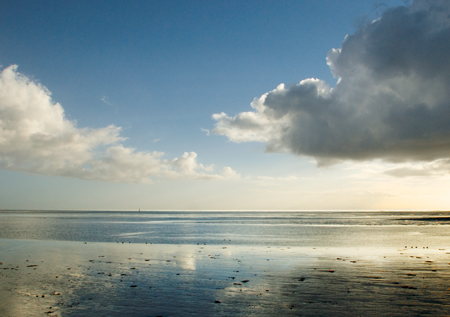
Living in Manhattan in my twenties and, now, visiting it in my commuter marriage was and is enjoyable from a lair in a subsidized apartment building on the corner of 125th street and Riverside Drive overlooking the majestic Hudson River, originally from the 10th floor and more recently from the 21st floor. My life runs in cycles. Can you drift within a circle?
Hiking in the Rockies or Alps, I am attracted to Alpine lakes.
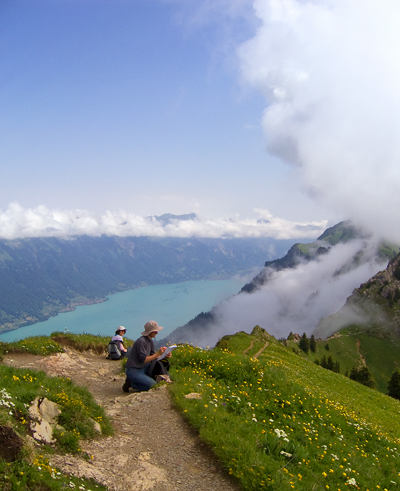
In my professional traveling, I counter balance the monotony of socializing with colleagues through meeting locals. From an meeting in Albuquerque, I drove to Valdez, where my friend Barbara had rented a tiny Adobe house in this Hispanic village halfway between Taos and the Ski Valley. Of course, there was water, the Rio Hondo ran along the road across from her house. I meet Barbara, a window rep, when I looked for the country that Georgia 0’Keefe had painted. She gave me a lift when my car broke down. Then in her early forties, Barbara decided it was high time to have a child. She is raising Zia on her own not wanting to live with the chosen impregnator, an artist who overdoes recreational drugs.
These years, I am enjoying my rambles through the dunes of Lake Michigan. It is never boring because, after each winter, their microgeometry is newly sculpted by winter storm.
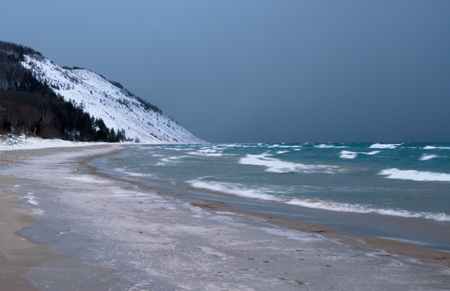
Is ‘drifting’ helped or hurt by a sense for direction? Rambling in the open dunes is relaxing because there, I cannot get too deeply lost. I fully lack a sense of direction. Once, when I tried making my way through a forest in the dunes, I managed walking in a circle. Coming back to the beautiful willow branch lying across the path where I had started out taught me, not a forester by training, not to enter the woods without a technical device. Earlier, during mountain hiking, I either stay on trails, or when getting off the beaten paths, I turned around every few minutes to memorize landmarks behind me because a wise friend once told me that, in the mountains, you always come down the same way that you go up.
During the last few summers, I counterbalanced high-strung professionals by sitting with a farmer’s wife selling strawberries, raspberries and corn from her garage in farm country bordering on a National Lake Shore in Michigan. I will always remember my last telephone conversation with Lillian, who died last week at the age of 91 from congestive heart failure. In her frisky way she told me how wonderful she felt now that they ‘shocked?’ her heart. Lillian was remarkable for her indomitable spirit, her bright eyes within a deeply furrowed face surrounded by red curls. At the age of thirty, after World War II, Lillian had traveled from Georgia to Japan to work as a secretary. Injuring her ankle, she met her future husband, a nurse in the military hospital, who was born on a small island in Lake Michigan.
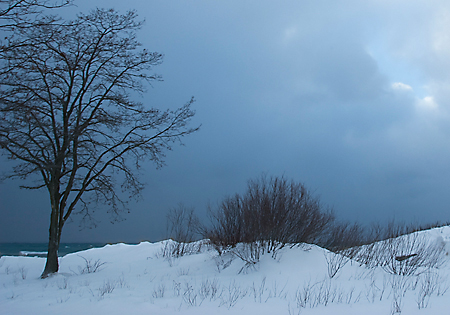
Is drifting helped or hurt by a strong spatial memory? Troels’ hobby is to map out the country by car, east coast or west coast from San Diego to Alaska and now, during the last decade, Northern Michigan as well. At first, I thought that I was suffering from dementia when Troels said things like, do you remember this road from last year? But then, I consoled myself that Troels must have a much larger hippocampus than I do. Also, as a geometer, he is constantly honing his natural spatial ability.
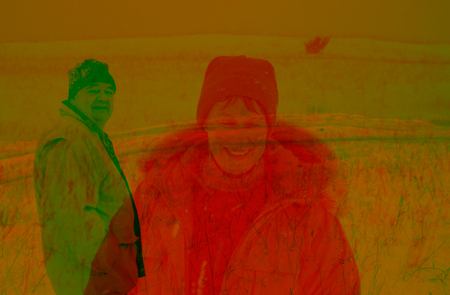
Turned on to the idea of psychogeography, I am now trying to figure out how my spatial memory works and what the ingredient for my ‘drifting’ are. Water, a sense for adventure accompanied by a lack of sense of direction? A spatial memory that is poor when not accompanied by a memory for people or some ‘panpsychic’ feeling?

Birgit, that photo of the alpine lake is a knockout! Is that Switzerland?
It is near Interlochen in Switzerland.
Birgit,
Water is clearly a theme and an attraction in your life, and certainly it would influence how you drift in either a known or unknown place. Actually, I think most people are drawn to water, though probably for lots of different reasons. Perhaps one aspect of it for you is that it would give you an immediate and secure sense of orientation. You can always see where you are, and can’t really get lost following a shore (no branching paths to distract you).
I again like your composite image. The technique might be a good way to express how you react to a place (memories, associations, feelings) at the same time as showing the place. Psychogeographic photography.
Steve, that is a good point. Water offers the security of a landmark.
It is also interesting what you said about the composite. That had not occurred to me. So far, I had thought about sticking people into landscapes without revealing too much about them – nudity of my grand children.
Birgit,
Your question — “is drifting helped or hurt by a sense of direction or a poor spatial memory” is provocative, because a sense of direction and a spatial memory could interfere with “drift” (as I understand it.) Spatial memory puts you into a clear abstract relationship with the 4 directions and, for example, where the ne/sw mountain range is going to. It gives direction, which seem opposite of drift.
Maybe it’s just me. I can’t conceive of a true “drift” in the sense of uncontrolled, un-thought-out movement. Perhaps it’s because I know the wind is a factor of causation, just as water runs downhill with gravity. So if one drifts on the wind or water, it isn’t exactly will-less.
So “drift” as a concept eludes my poor brain. But there are other ideas that psychogeography seems to carry with it that are less intimidating to sort through.
Will Self, in an interview on Living on Earth, says that “in order to have a profound relationship with place… you have to look for those places that choose you in that way and say ‘you know, you’re not going to be here for a day or so or a couple of days, you’re going to have an evolving, perhaps a lifetime relationship with me. I’m a place that you want to know about’ And I think, you know, for all of us who, who think about, about the world, and who think about our place in it, that that’s true. That has a resonance. And when I look back over my own life, I mean — you know, a couple of the places that I’ve come to think of as kind of ‘my places’ over the years, I didn’t even like them when I went there. It was about liking. It wasn’t necessarily about having a good time. There was something more profound going on.”
I liked this quote because it takes the concept of “drift” — just going here and there without volition or purpose — and adds to it the notion that places choose you — that your willessness doesn’t mean you won’t get stopped and forced to respond. The place will get to you, somehow.
Your composite, it seems to me, feels a bit like a teasing visual of the Place that Chose You.
June,
I am still thinking about ‘drift’ and what it means to people as different as Troels and I with respect to our spatial ability.
I didn’t even like them when I went there… . I have been there.
And on Artdaily.org, today there is a link to an exhibit in London called the Discovery of Slowness. Part of the exhibit is described in this way:
“The third video uses film footages to construct a sense of place: “Keep” is a film of Berwick [England] and its surroundings made up of fragments of feature fims that have used the area as a setting. Excerpts from Jean Vadim’s One More Kiss (1999), Roman Polanski’s Cul-de-Sac (1966) and Ken Russell’s The Devils (1970), amongst others, are edited together to recreate a loose narrative taking place in the same location.”
Somehow that is another version of no-place — of no sense of place as the psychogeographers would define it.
http://www.artdaily.org/index.asp?int_sec=2&int_new=23216